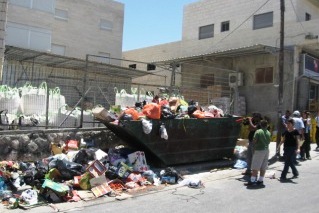 Sanitation conditions in East Jerusalem
Sanitation conditions in East JerusalemTen years after the government pledged in the High Court that it would take care of the Jerusalem residents on ‘wrong’ side of the separation barrier following its construction, the situation has deteriorated dramatically. Garbage lies uncollected on the streets, infrastructure has collapsed and the neglect and isolation has turned these neighborhoods into a no-mans land. Today, the Association for Civil Rights in Israel sent an urgent plea to Prime Minister Benjamin Netanyahu demanding that the government fulfill its obligations and stave off the neighborhoods’ continued degradation.
A decade has passed since the beginning of the construction of the separation barrier in Jerusalem, and the reality for the Jerusalem residents that live in neighborhoods beyond the barrier has become unbearable.
- Basic infrastructure such as water and sewage have collapsed.
- Israeli ambulances have stopped entering the area, and promises made by the state to establish hospitals and health clinics have not eventuated.
- The Jerusalem municipality operates only four public schools for the tens of thousands of children living in the area.
- Officials from the Jerusalem Municipality do not enter these areas which fall within the municipality’s jurisdiction. Officials do not even know the number of residents residing there.
- Basic services such as rubbish collection, road repairs and street lighting are not provided in these neighborhoods. Authorities do not respond to the frequent complaints on the matters.
- Residents suffer from severe delays and abuse at checkpoints to enter the rest of the city. Despite government promises, the police and IDF are not working to change the situation.
In July 2005, the government of Israel passed Government Decision # 3783 that sought to implement a set of arrangements that would enable the continuation of normal life for residents of Jerusalem neighborhoods that were left on the other side of the barrier.
The decision obliged a range of government ministries, as well as the Jerusalem Municipality, to develop services in these neighborhoods including health, education, welfare, employment and postal services. In the decade that has passed since this decision, the vast majority of commitments have gone unfulfilled and there is currently no government plan to realize them.
[To view a comparison of the government commitments and the reality today – see this table]
A decade ago, in the framework of the court discussions on the route of the barrier, the government pledged that the barrier would not cause significant harm to the residents’ freedom of movement. The government further promised that the tens of thousands of Palestinian Jerusalemites living within the municipal area of Jerusalem, but behind the separation wall, would receive all the services that they were entitled to by virtue of their permanent residency status. On the basis of these firm governmental commitments, the High Court of Justice rejected the legal petition. And yet the commitments were never implemented in reality.
The residents of the Kafr ‘Aqab and Semiramis, Ras Khamis, Ras Shehada, Dahiyat al-Salam, and the Shuafat Refugee Camp, comprising tens of thousands of Jerusalem residents, suffer daily violations of their basic rights. Authorities refuse to take responsibility for their welfare and residents’ repeated requests to the municipality and other official bodies go unanswered. Residents are forced to raise money on their own to take care of basic issues such as paving roads, filling potholes and establishing schools and kindergartens.
The letter that ACRI sent to Prime Minister Netanyahu makes clear that the intolerable living conditions in these neighborhoods, and the unbearable reality at the checkpoints, constitute a violation of the government’s obligations. In order to remedy this situation, there is an urgent need to create a comprehensive plan and allocate the necessary funds to fulfill the government’s commitments. To coordinate the work of the various ministries and authorities, an inter-ministerial working group headed by a senior governmental figure should be immediately established.
Additional Materials
Key excerpts from the letter in English.
Annex to letter – comparison between commitments and current reality.







